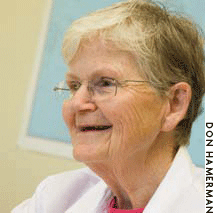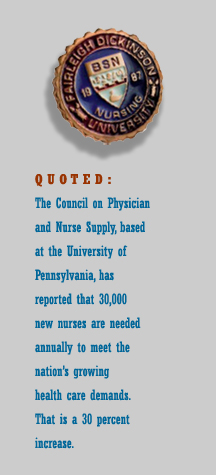

The nation is facing a shortage of nurses, coupled with an increased demand for health care. Find out how FDU is addressing the challenge.
The Campaign for Fairleigh Dickinson University is nearing its $50-million goal.
FDU’s Institute for Forensic Science Administration is applying the principles of economics and business to examine flaws in forensic science.
Ramatu Musa, BA’09 (T), interned at the U.S. Mission to the United Nations in Geneva, Switzerland. FDU Magazine shares her summer travelogue.
Pollster John Zogby has declared America’s youth to be the first global generation. Are they? FDU’s experts comment.Alumni Profile
Clean Power Cells
Gerald DeCuollo,
BS’77 (M)Alumni Profile
Glass Ceiling to Crown Heights
Rosemary Espanol,
BA’70 (M)

A World of Opportunities
Health care trends, coupled with today’s economy, makenursing — and health care in general — one of today’sbest employment prospects. The U.S. Department of Labor reportedin December, “The health care industry has added613,000 jobs since the recession began in December 2007.”
“When patients are admitted to hospitals, it is largely because they need round-the-clock care and access to technology not available on an outpatient basis,” says Sheryl Slonim, BS’76 (R), executive vice president of patient care at Holy Name Hospital in Teaneck, N.J. And vacancies in hospital nursing staff make providing quality care a struggle. It’s not that there is a lack of interest in hospital work. In fact, most nursing school graduates hold their first jobs in hospitals.
However, she adds, “The learning curve for a new nurse is long.” And too often hospitals lose good nurses just as they reach the top of that curve. The voluntary annual turnover rate among first-year nurses has been reported at greater than 27 percent.
“With the requirement to lead patients through the system more expediently becoming more challenging,” says Slonim, “having competent nurses is more crucial than ever.” But how does one retain nurses who excel? “The way we retain nurses for the long run is to reward for clinical excellence at the bedside,” Slonim says. Tying financial reward to quality of care that is tangible, coupled with allowing nursing staff “the abilityto affect and to be in control of the care rendered,” has helpedHoly Name develop and retain excellent staff. In recognition ofthis, the American Nurses Credentialing Center, has awarded thehospital Magnet Status, placing it among the top five percent ofhospitals nationwide in terms of the quality of patient care.
programsBeyond the Hospital
Hospital nursing is only half the story. The New Jersey Collaborating Center for Nursing reports that in the state, about 40 percent of nurses are employed outside of hospitals.
Opportunities for nurses are growing in areas such as longterm care and community health as the continuum of care shifts away from inpatient care. Slonim observes that over her career in nursing, “The patients that were hospitalized in intensive care are now the patients we have on the floors.” Because of insurance demands, hospitals are pressured to “move the patient back to their home environment, whether it be their own home, an assisted living facility or a retirement facility.”
This is where community health services such as the Visiting Nurse Service of New York (VNS) come into the picture. “Visiting nurse care is the next step for those patients who leave the hospital too soon,” says Maureen Freundlich, MPA’95 (T), director of recruitment and staffing for VNS.
Parietti adds, “The acuity level has increased tremendously in community care. For example, patients are sent home with equipment than makes you wonder just how they are going to manage.”
Other areas in need of nurses include retirement homes and sub-acute care. FDU offers a clinical track for adult nurse practitioners. “These graduates are qualified to provide primary care and have more managerial skills than RNs,” says Guttman. They may be able to fulfill these needs.
With health care under the microscope of Congress and American citizens becoming more and more in tune with changes in the industry, quality health care has come to mean quality preventive care and education. These are perfect roles that can be filled by experienced, well-educated nurses.
“Nursing is a path that provides multiple opportunities,” says Freundlich, a registered nurse who also holds a bachelor of arts degree in psychology along with her FDU master of public administration. The opportunities extend beyond hands-on clinical care and hospitals to included research and management.
Nurses can work “in corporate positions, research and even politics,” comments Guttman. “The head of the Health Resources and Services Administration, Mary Wakefield, is a nurse.”
Slonim, who is certified in neonatal intensive care (RNC) and advanced nursing administration (CNAA), has had a widely varied career path including work in pediatric neonatal intensive care, a position as a nurse educator (with a master’s degree in education from Rutgers University), administrative positions including assistant vice president and then vice president of nursing, and even a four-year tenure as a hospital CEO.
Slonim, who at age 55 anticipates completing her doctoral studies in May, encourages nurses to “Never stop learning.” Whether in the classroom or on the job, she says nurses need to be “like sponges, absorbing everything around them.
“Nurses will always have opportunities,” she concludes, “as long as we adjust our sails and go in the diretion that is set before us.”
FDU Magazine is published twice yearly by the Office of Communications and Marketing, Fairleigh Dickinson University, 1000 River Road, H-DH3-14, Teaneck, N.J. 07666.
FDU Magazine welcomes your comments. E-mail Rebecca Maxon, editor, at maxon@fdu.edu or make a blog entry at MyFDU.net.
J. Michael Adams, President; Richard Reiss, Senior Vice President for University Advancement; Angelo Carfagna, Assistant Vice President for University Advancement and Communication; Okang McBride, Director of Alumni Relations; Carol Kuzen Black, Director of Publications/Senior Editor; Rebecca Maxon, Editor and Web Designer; Nina Ovryn, Art Director
Contributors: Mary Ann Bautista, Roger Koppl, Andrew McKay, Ramatu Musa, Tom Nugent, Melissa Payton
Photo/Illustration Credits: John S. Dykes, Don Hamerman, istockphotos.com, Shelley Kusnetz, Weaver Lilley, Katharine Marks, Arthur Petrosemolo, Nick Romanenko, Danny Schwartz, Adena Stevens
For a print copy of FDU Magazine, featuring these and other stories, contact Rebecca Maxon, editor, at maxon@fdu.edu.
To update your address e-mail fine@fdu.edu or update your profile online at www.MyFDU.net.
©Copyright 2010 Fairleigh Dickinson University. All rights reserved.





